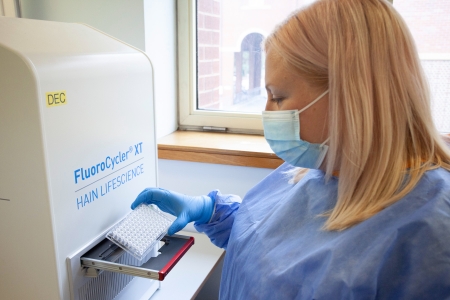
The Microbiology team at Doncaster and Bassetlaw Teaching Hospitals (DBTH) have completed 175,000 Polymerase Chain Reaction (PCR) COVID-19 tests, with on-site labs testing an average of 400 samples a day.
As the pandemic began, the team, which is housed at Doncaster Royal Infirmary, were sending their tests to Sheffield Teaching Hospitals. However, given the limited capacity at the time, this only allowed for 50 swabs to be checked per day, and as cases rose, so did the pressure on the testing systems.
In a bid to increase the number of PCR samples that could be analysed for patients at Doncaster Royal Infirmary, Bassetlaw Hospital and Montagu Hospital, Microbiology, led by Michael Leng, Head Biomedical Scientist in Microbiology at DBTH, began exploring the possibility of setting up an inhouse solution rather than sending their tests away. The goal in doing so was to allow for a significantly larger pool of results than they previously had been able to produce, ultimately improving the experience for patients as well as safety as COVID-19 began to circulate locally.
With their objective in mind, the team worked night and day to implement inhouse testing, and by the start of April 2020, the COVID-19 Microbiology team made up of around 12 people, and with the help of the Trust’s Procurement department, had equipment which would allow them to begin.
The first of these tests was successfully completed on the 9 April 2020. The following day the team completed 93 tests, and during peaks of activity throughout the pandemic, they were testing up to 700 samples a day. The benefits of this inhouse testing system were clear straight away, as the team could now get the result to the individual just 12 hours after they received the sample itself.
The COVID-19 Microbiology team then developed a way of ensuring that the results were given to the appropriate individual as soon as they were completed. Michael described this system, and how they came across it, saying: “Someone mentioned that staff members needed their results quicker to ensure trust areas could be staffed accordingly. We asked our IT department if we could use SMS messaging to text the staff member their result. We realised we could text negative and positive results directly to them as soon as they were authorised”.
Michael Leng and Michelle Poole (Chief Biomedical Scientist in Microbiology), regularly worked into the night to ensure that the tests were authorised, letting the individuals know about their results as soon as they could.
This allowed staff to return to work at a far faster rate than they previously would have been able to, thus ensuring that there were as many people available on site as possible to be able to provide care, safe in the knowledge that individuals were not carrying COVID-19.
The PCR tests themselves work by analysing the samples taken through the insertion of a long cotton bud into the nose and around the back of the throat of an individual. The Microbiology team then extract the viral nucleic acid from the specific sample, amplify it, and then finally analyse it, which will allow them to establish whether or not the individual has COVID-19.
The PCR testing method performed within the Trust has a sensitivity (chance of producing true negatives) of 97%, and a specificity (chance of producing true positives) of 98%. This method has also enabled the team to see if the individual has Flu A, Flu B, or Respiratory Syncytial Virus (RSV), allowing the team to not only tackle COVID-19, but also the other main winter pathogens.
Reflecting on his team’s achievements throughout the past 18 months, Michael said “It really wasn’t about any one individual, it was every member of staff in Pathology who have made this work possible. They have all done such a fantastic job and I hope they reflect on this time with real pride – they’ve all made such a profound difference and I count myself as fortunate to be a member of the Microbiology service at DBTH.”
